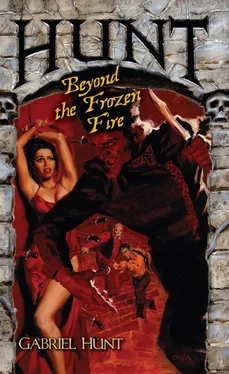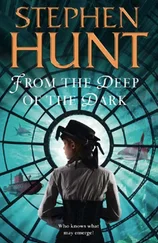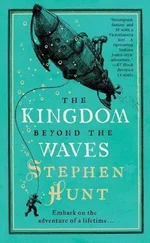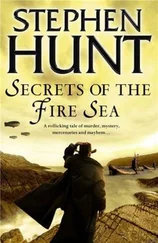He had no idea how quickly he would get his wish.
Michael was, as usual, in the library, head buried in a leather-bound volume so large it threatened to topple the mahogany bookstand on which he’d precariously balanced it. His sandy hair, or what remained of it, was neatly combed, and when he looked up Gabriel saw from the dark circles under his eyes that he’d been spending too many late hours in this room and too few asleep in the apartment one floor overhead. Michael looked Gabriel up and down and opened his mouth as if about to speak. Gabriel held up one weary hand.
“Look, I don’t want to hear another I told you so.” Gabriel said. Michael had never liked Fiona. “You were right.”
“Gabriel,” Michael said. “I…”
“All that matters,” Gabriel said, cutting his brother off as he removed his battered bomber jacket and unbuttoned the rumpled khaki work shirt he’d been wearing for nearly forty-eight hours of delayed and endlessly rescheduled travel, “is that the kindjal is safe at the Royal Museum where it belongs.” He peeled the shirt off and twisted his stiff shoulders like a boxer warming up for a fight. “But I could sure use a long hot shower. And a cold drink.”
That was when Gabriel noticed that there were two ice-filled glasses sitting on dark marble coasters on the antique cherrywood reading table. One of the glasses had a crescent of red lipstick on the rim.
“Gabriel,” Michael said. “Allow me to introduce Ms. Velda Silver.”
“Hello, Mr. Hunt,” said a warm, silken voice behind him.
Gabriel turned to face a tall, auburn-haired beauty. She sized up his shirtless chest with an arched eyebrow and a look of amusement in her wide-set hazel eyes. She looked to be in her middle twenties, conservatively dressed in a dark suit and simple heels, but the body beneath the drab professional exterior was anything but drab. Strong and athletic yet still distinctly feminine, with a generous, natural bust and graceful, rounded hips. She seemed way too tan and healthy to be a native New Yorker—but then so did Gabriel. She looked, he thought, like the kind of woman who held down an executive position during the week but went white-water rafting or mountain climbing when Saturday came around. Her legs in particular were breathtaking.
Gabriel casually tossed his shirt over the back of a chair as if he routinely greeted guests bare-chested, smiled and extended his hand to her.
“What can I do for you, Ms. Silver?” he asked.
She took Gabriel’s hand with a warm, strong grip. Her nails were short and unpainted. Her gaze, a challenge.
“I have a proposal for you,” she replied. “I’m organizing an important expedition and I’d very much like to have you head it up.”
Gabriel looked over at Michael, whose expression told Gabriel that he had already heard her pitch and thought the woman was off her rocker. Gabriel shrugged.
“Okay, shoot,” he said.
“My father,” she said, “Dr. Lawrence Silver, has been working for seven years at a remote research station near the South Pole, studying the effects of global warming. I’ve visited him there twice, the last time just six months ago. Things seemed to be going fine. Then a few days ago I got word that he disappeared during a routine trip to sample core ice from the site of an unusual formation. He’s been missing for over two weeks.”
Gabriel looked at Michael again and then back at Velda. Even during what passed for summer at the South Pole, two weeks lost without food or shelter was as good as dead.
“I’m very sorry to hear that, Ms. Silver,” Gabriel said. “But I’m no expert in polar search and rescue. If I’m known for anything, it’s finding lost artifacts, not lost people.”
“I’m well aware of your field of expertise,” Velda said. “That’s why I came to you. Every reasonable rescue effort to save my father has already been made by a highly qualified search and rescue team. Tragically, to no avail.” She paused, pressed her lips into a tight, anxious line. “But there’s more. May I have another drink, please?”
Michael refilled her glass from a crystal decanter of fifteen-year-old single malt scotch and then poured a glass for Gabriel as well.
“Thank you,” she said, taking a sip of the scotch and then sucking a small piece of ice between her even white teeth. “I think my father found something truly extraordinary before he lost contact with the research station. You are one of the few people in the world I believe would be open-minded enough to help me track it down and comprehend it. I have a recording of my father’s last transmission. Would you be willing to listen to it?”
“Sure,” Gabriel said, downing a healthy swallow of his scotch.
Velda took a CD in an unmarked jewel case from her purse and handed it to Michael, who slipped it into the laptop computer sitting on the far side of the reading table.
After a few seconds of silence, broken only by the tapping of Michael’s efficient keystrokes, a harsh cloud of static came out of the computer’s speaker, followed by a male voice, struggling to be heard over the background noise.
“…a deep, vertical fissure…” The voice faded in and out; only disjointed fragments of sentences came through. “I am uninjured but unable to…” A burst of static drowned out what he was unable to do. “…sud denly quite warm…”
There was a lengthy pause, nothing but a low soft hiss punctuated by occasional pops and crackles.
“I don’t—” Gabriel started to say.
“Sh,” Velda said. “Listen.” Then to Michael: “Could you please turn up the volume?”
More hissing, only louder now. Gabriel was starting to suspect Michael was right about Velda; the Foundation certainly got its share of crazies, mostly by mail (or these days, e-mail), but once in a while showing up in person. Of course, most of them didn’t look as appealing as this one, but—
As he was about to politely send her on her way, the male voice spoke again, a single distinct sentence rising above the ambient noise.
“I see…trees,” the incredulous voice said.
Then the recording abruptly ended, leaving the room hushed and its occupants thoughtful and silent.
“Trees?” Gabriel repeated. “There are no trees in Antarctica.”
“Precisely,” Velda said. “I think my father stumbled upon some kind of climatic anomaly. A hidden, subterranean warm spot—perhaps a preserved window into Antarctica’s verdant prehistoric past. Furthermore, in an environment where trees could survive, it might be possible for my father to survive as well, for longer than normal, anyway. Mr. Hunt, I believe that my father could still be alive. I believe that he has discovered something of unprecedented scientific and historical significance, and I want to organize an immediate expedition to trace his path, verify his findings…and hopefully bring him home alive.” Her cheeks were flushed, her eyes bright. “Are you with me, Mr. Hunt?”
Gabriel had to admit he was intrigued. He emptied his glass and set it down.
“Let me make some calls,” Gabriel said. “I’ll get back to you in two hours with a definite answer.”
Velda nodded and tossed back the rest of her drink.
“Thank you, Mr. Hunt,” she said, setting a simple off-white business card on the table alongside her now empty glass. “I look forward to your response.”
Gabriel couldn’t help watching the graceful sway of her hips and tan, muscular legs as she walked swiftly away.
“What do you make of that?” Gabriel asked his brother, once she was gone.
“Lawrence Silver is seventy-five years old,” Michael said. “He’s a tough specimen—survived one of the camps as a child; Buchenwald, I think—but still, seventy-five is no age to be traipsing around the South Pole. Then this…” Michael shook his head. “The poor man was obviously near death and hallucinating at the time he made that transmission. Modern geothermal imaging and satellite photography have mapped every inch of the Antarctic landscape. No ‘warm spot’ could possibly exist and escape detection.” He pressed the Eject key and Velda Silver’s CD slid out of the computer. He tossed it on a stack of rejected grant proposals. “You would have to be as deluded as she obviously is to take on a pointless and dangerous expedition like this.”
Читать дальше












